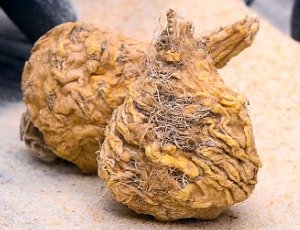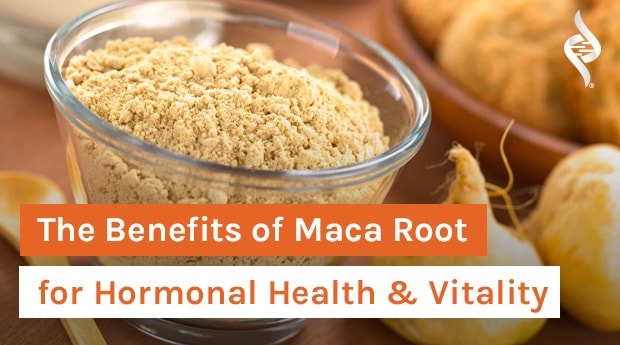The Benefits of Maca Root for Hormonal Health & Vitality
In a hurry? Click here to read the Article Summary...
More than two centuries ago, Peruvians discovered that a tuberous vegetable growing high in the Andes mountain range had some noticeable benefits for their health and endurance. Men going into battle or performing other physical feats would take maca because they observed that it gave them stamina, strength, and virility.
Meanwhile, women who consumed maca had better reproductive health, energy, and focus. Does maca have something special in it that confers all of these benefits? Read on to discover just what it is that makes maca so marvelous.
What Is Maca?
Growing at an elevation of 12-14,000 feet above sea level in the Andes mountains of Peru, maca grows in extreme weather  conditions. Thriving in a habitat of intense sunlight, cold temperatures, and strong winds, this tuberous plant is a part of the brassica family. Just like cauliflower, broccoli, and cabbage, maca is a cruciferous vegetable.
conditions. Thriving in a habitat of intense sunlight, cold temperatures, and strong winds, this tuberous plant is a part of the brassica family. Just like cauliflower, broccoli, and cabbage, maca is a cruciferous vegetable.
Nutrients Found in Maca
Maca contains plenty of healthy fatty acids, the most abundant being linoleic, oleic, and palmitic acids. Maca contains vitamins A, C, B2, B6, and niacin, as well as minerals – zinc, iron, iodine, copper, calcium, potassium, and magnesium. Nine amino acids are considered essential for optimal health, and maca contains seven of them [1].
Maca is also a rich source of plant sterols, which are part of what makes it so beneficial for hormonal health. Plant sterols are (chemically speaking) structurally similar to the body’s own hormones such as estrogen, progesterone, and testosterone.
Maca Is an Adaptogen
So how exactly does it work? Maca is an adaptogen, meaning that it works to strengthen, balance, and help the body respond to internal and external changes and stressors. It regulates the production of hormones to maintain healthy organ function. Maca feeds the hypothalamus, pituitary, and adrenal glands, known as the Master Glands (more on that later).
Maca’s plant sterols appear to stimulate changes in the action of the hypothalamus, pituitary, and adrenal glands. Maca also seems to exert an influence on the ovaries, pineal gland, and thyroid.
How Maca Can Aid Fluctuating Hormones
Premenstrual Syndrome (PMS) is one of the most common complaints among women of reproductive age. When out of balance, estrogen – the hormone responsible for regulating the reproductive system – can cause a wide range of symptoms and annoyances for women (and their men!).
Mood swings, water retention, fatigue, food cravings, irritability, headaches, irregular menstrual periods, painful cramping… all can be attributable to estrogen imbalance.
Maca can help ease the rapid rise and fall of hormones in menstruating women due to its adaptogenic properties. Also, by improving the connection between the brain and the pituitary gland, maca’s ability to help balance levels of circulating hormones is further enhanced. Most PMS sufferers taking maca report a marked improvement in symptoms during their first menstrual period after commencement of maca.
Other times when maca may be of benefit to women is after coming off birth control pills, and after having a baby and breastfeeding has ceased. At such times, endocrine system function can be depleted, and maca’s adaptogenic properties mean it can help the body right itself again.

Maca can also ease many of the symptoms of perimenopause and menopause. For those harried by hot flashes, night sweats, insomnia, depression, anxiety, and lack of energy, maca can provide some much-needed relief. Maca does not appear to mimic estrogen in the body but it can help to increase the body’s production of estrogen if levels are too low. That’s the beauty of an adaptogenic herb: it adapts to what the body needs.
In a 2006 clinical trial, 34 early-postmenopausal women were given a supplement containing either maca or a placebo twice per day for four months. Those receiving the maca had increased levels of estrogen, suppressed levels of FSH, T3 thyroid hormone, adrenocorticotropic hormone, and cortisol (the hormone secreted in response to stress). Body mass index also decreased. Iron levels increased, however, as did bone density markers, and maca relieved many of the symptoms of menopausal discomfort such as hot flashes and night sweats [2].
Another small 2014 clinical study found that maca reduced blood pressure and depression in postmenopausal women [3].
Can Maca Can Also Benefit Men?
Maca can also be helpful for male health. Recent studies have indicated that maca may assist male health by helping to increase sperm count and motility, increasing sexual desire, protecting the prostate and reducing the incidence of benign prostatic hyperplasia, reducing stress and depression, boosting energy levels, and easing mild erectile dysfunction [1, 4].
8 Additional Health Benefits of Maca
#1. Boosts Energy and Endurance
A 2009 study of male cyclists found that maca supplementation did indeed improve cycling time performance, as well as sexual desire (a perk for many) [5].
#2. Hypothalamus/Pituitary/Adrenal (HPA) Gland Nourishment
HPA glands are called the “Master Glands” because they regulate other glands (you may also hear it termed the “HPA Axis”). When HPA is well nourished, other glands of the body benefit as well. When under stress, the adrenal gland takes a big hit, especially if the stress moves from acute (short-lasting stress) to chronic (long-lasting stress).
Maca feeds all three glands by supporting the body’s production of hormones, either increasing or decreasing levels according to the need. As a result, maca may help prevent or repair adrenal exhaustion and all of the unhealthy follow-on effects this has on the body and mind.
#3. Libido Booster
Maca has been used traditionally by Peruvians to boost virility and libido. Science has not yet determined how maca does this, but it has been called “Nature’s Viagra” for good reason.
Some health experts believe maca’s effects on libido may be caused by its long-chain fatty acids known as macaenes and macamides, which are unique and have not been found in any other plant.
A 2008 clinical study followed women suffering from sexual dysfunction caused by selective serotonin reuptake inhibitors (SSRIs) for depression. The study found that three grams of maca per day gave significant improvement in libido for the women taking it [6].
#4. Cardiovascular Health
Maca’s phytosterols – campesteroland beta-sitosterol, act to interfere with the absorption of LDL cholesterol (the so-called “bad” cholesterol), making maca beneficial for the cardiovascular system [7]. Phytosterols have also been studied for their anti-inflammatory effects, which assist in balancing the immune system, and, as an added bonus, help to protect the body from abnormal cell growth.
cholesterol (the so-called “bad” cholesterol), making maca beneficial for the cardiovascular system [7]. Phytosterols have also been studied for their anti-inflammatory effects, which assist in balancing the immune system, and, as an added bonus, help to protect the body from abnormal cell growth.
#5. Anti-Cancer
A 2015 study found that phytosterols interfere with many different pathways in the carcinogenesis (cancer beginning) process [8]. In addition, an animal study found that beta-sitosterol decreased levels of circulating estrogen, and inhibited the growth of estrogen-receptor positive breast cancer tumors [9].
#6. Boosts Immunity
The phytosterols in maca stimulate the immune system and increased levels of interleukin-2 and natural killer cells [7] which the body needs to fight abnormal cell growth.
#7. Liver Support
Being a cruciferous vegetable, maca contains glucosinolates which, when chewed and digested, change into health-promoting chemicals that help protect against cancer. Sulfur-containing glucosinolates form bonds that help the body’s enzymes do their work better.
Both sulfur and plant sterols are required in the production of a master antioxidant called glutathione which boosts liver function and helps the liver with detoxification [10].
#8. Healthy Bones
Maca’s vitamins and minerals can help to build strong, healthy bones. A 2006 clinical trial found that maca increased bone density markers for the early-postmenopausal women taking it [2].
How to Take Maca
Look for organic maca powder grown in Peru. Maca can be added to juices, oatmeal, inside sandwiches, sprinkled on salads, and added to raw food recipes. Just keep in mind that it is best not to heat maca powder to high temperatures which might diminish some of its nutrients. If you use it in recipes, add it after cooking, just before serving.
A gentle approach is generally the best way to begin taking maca.
Recommendations are to start with a small dose of 1 teaspoon per day. If that is well tolerated, gradually increase the dose to 1 tablespoon, or more. If you haven’t noticed any improvement, remember one trial had women taking 3 grams per day.
It can take two or three weeks before you may notice the full benefits of maca. It is also recommended to only take maca daily for a few months and then take a break from it for a month or so before resuming consumption again.
Some health experts recommend avoiding maca under the following conditions. Please consult with your own healthcare provider if:
- you are between the ages of 15 and 35, have a good, mainly plant-based diet, and don’t have mood swings, fluid retention, or any of the symptoms of PMS
- you have an allergy to iodine
- you have Hashimoto’s disease or hyperthyroid condition
If hormonal fluctuations are creating havoc in your life, consult your natural health practitioner to see if maca might be right for you.
Organixx Clean Sourced Collagens blend contains five types of collagen from four sources. What’s more, it’s combined with targeted nutrients such as zinc, vitamin C, and vitamin B6 which specifically enhance the bioavailability and potency of collagen. Clean Sourced Collagens is formulated from the ground up to enhance and support your body’s natural ability to heal and rebuild itself from the INSIDE out.

 Sources:
Sources:
Article Summary
Maca is a cruciferous vegetable that grows at high elevation in the Andes mountains of Peru.
Maca contains plenty of healthy fatty acids, the most abundant being linoleic, oleic, and palmitic acids.
Maca contains vitamins A, C, B2, B6, and niacin, as well as minerals – zinc, iron, iodine, copper, calcium, potassium, and magnesium. Nine amino acids are considered essential for optimal health, and maca contains seven of them.
Estrogen imbalance is linked to a number of symptoms including mood swings, water retention, fatigue, food cravings, irritability, headaches, irregular menstrual periods, and painful cramping.
Maca can help ease the rapid rise and fall of hormones in menstruating women due to its adaptogenic properties. It has demonstrated benefits for PMS, after coming off birth control pills, as well as after having a baby and breastfeeding has ceased.
8 Additional Health Benefits of Maca
- Boosts Energy and Endurance
- Hypothalamus/Pituitary/Adrenal (HPA) Gland Nourishment
- Libido Booster
- Cardiovascular Health
- Anti-Cancer
- Boosts Immunity
- Liver Support
- Healthy Bones
Maca is one ingredient of Organixx E-Plexx hormonal support formula for women.




Can I take maca if I had a stroke 2 years ago? I have high blood pressure also.
Your articles ate awesome.
We're glad to know that you are loving our posts, Suzanne. With regards to your concern, we suggest working with your primary care physician to help you determine whether this would be appropriate for your personal needs, and if so, what serving recommendation would be best suited for you. We wish you the best in your health and wellness journey!